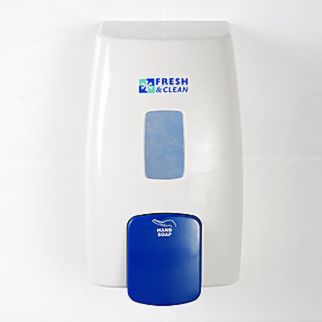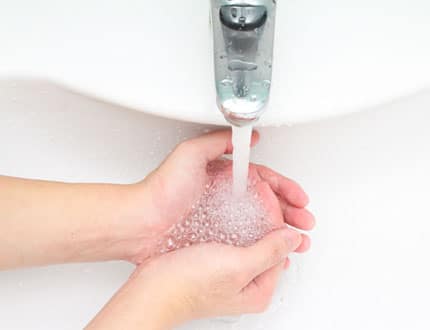There is no better way to reduce the spreading of germs and potentially deadly diseases than hand washing.
Nowadays, it is very fortunate that there are many ways to clean one’s hands. We owe that thanks to the inventors of hand sanitisers.
It is recommended to use these bottled gels as a substitute for the outdated handwashing with soap and water.
It is also said that it’s efficient in killing germs and keeping the hands clean.
However, is it all completely true? How good are hand sanitisers compared to hand soaps? Do they actually remove almost 100% of the germs on your hands? Let’s find out!
Hand Washing With Soap
It has been proven that handwashing with soap and water rids you from bacteria such as c.difficile. It’s a very dangerous bacteria and it can lead to debilitating diseases. Hand washing has to be done properly in order to prevent bacteria from contamination. The question is, what is proper?
Proper handwashing means pouring 1-3 ml of soap into your hands. It needs to be turned into a lather by scrubbing for at least 20 seconds. You also need to mind your fingers, fingernails, wrists and if possible, forearms. Afterwards, rinse your hands well and don’t forget to dry them!
Studies have shown that crucial thing to effective hand hygiene is drying. There is a correlation between the hand dampness and the bacteria amount that can be transferred to the surface. Meaning, if you leave your hands wet, your skin will most likely become an even better place for bacteria to breed.
A Must (Not)
There is one more thing you should know! Refrain from rubbing your hands while you’re drying them. An interesting study was conducted at the University of Bradford. It says that it brings bacteria back to the surface if you rub your hands together.
A lot of people rub their hands together in order to dry them faster. That’s why hand dryers are not the best option, but they are still good. On the other hand, paper towels are much better for drying because they prevent your hands from touching each other. That’s why towels are the best!
Anti-Bacterial Soaps
Antibacterial soaps have proven themselves to be as efficient as regular soaps. However, be cautious when using antibacterial soap! It’s possible for consumer antibacterial soap (unlike the soap used in hospitals) to increase bacterial resistance to antibiotics. If you happen to use antibacterial soap, it would be best to use brands trusted by industrial workplaces and clinics.
What About Hand Sanitisers?
Are hand sanitisers really 99% effective as people claim? Yes. However, not actually on the hands. The thing is, products like these are most of the times tested on inanimate surfaces. The results are different if tests are performed on hands.
It may seem as if hand sanitisers are useless, but it’s not so. What’s really efficient at killing bacteria are alcohol-based hand sanitisers. Many doctors recommend using them. That’s because they’ve proven them efficient in preventing viral and bacterial contamination, with some exceptions.
Hand sanitisers are useful when hygiene facilities are not available. However, they cannot replace traditional handwashing with soap and water. That’s because of the presence of more dangerous bacteria types that cannot be eliminated.
Also, hand sanitisers are less effective than soap and water in reducing dirt and grime. The traditional routine is the best solution if your hands are visibly dirty. If not, you can be forgiven for using a hand sanitiser, until you get to use soap and running water again.
The Right Choice
Alcohol is an antiseptic, which is the essential component of a hand sanitiser. However, it doesn’t have to mean that any hand sanitizer with alcohol in it is a good one. Always aim for one that has at least 60% of alcohol. Anything less than that is not effective.
Additionally, it is of great importance to know how to use hand sanitisers in a proper way. Firstly, don’t be afraid to spend too much sanitiser.
Freely squirt more than one dose on your hand. Afterwards, spread it all over the surface of your hands, including the space between your fingers and your nails. Stop only when the sanitiser has dried out.
Implementation Of Hand Sanitisers
 If you are wondering whether to invest in soap dispensers or in hand sanitisers, there should be no uncertainties. Invest in both if you’re willing to provide your workers with a fresh and healthy work environment.
If you are wondering whether to invest in soap dispensers or in hand sanitisers, there should be no uncertainties. Invest in both if you’re willing to provide your workers with a fresh and healthy work environment.
By implementing proper hygiene measurements you will keep diseases away. You will also bolster your worker’s productivity even during the flu months. Every washroom has to be equipped with a hand soap dispenser. It’s helping us promote the routine of handwashing.
There is a very significant place in your office for the hand sanitisers. They have to be placed in a particular and strategic order.
For example, next to elevators, doorways, and floors that have no direct access to a restroom. Have this system installed! Even in the middle of a hectic day, your workers will remember to wash their hands.
The best hand hygiene products for your workplace can be found at Alsco. Hand soap dispensers, hand drying solutions, hand sanitisers and more can be found in their arsenal. If you visit Alsco’s Hand Care page, you will see the full spectrum of their equipment and products for your office. You can also speak with Alsco’s friendly sales representatives.
Photo courtesy of Freepik Images by shayne_ch13



